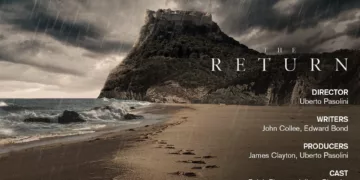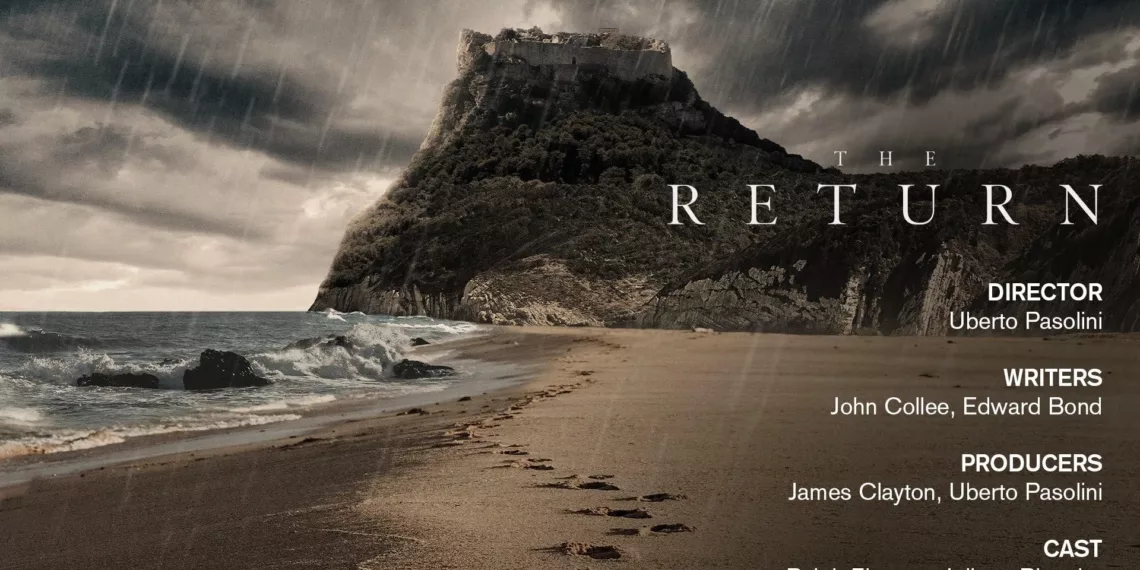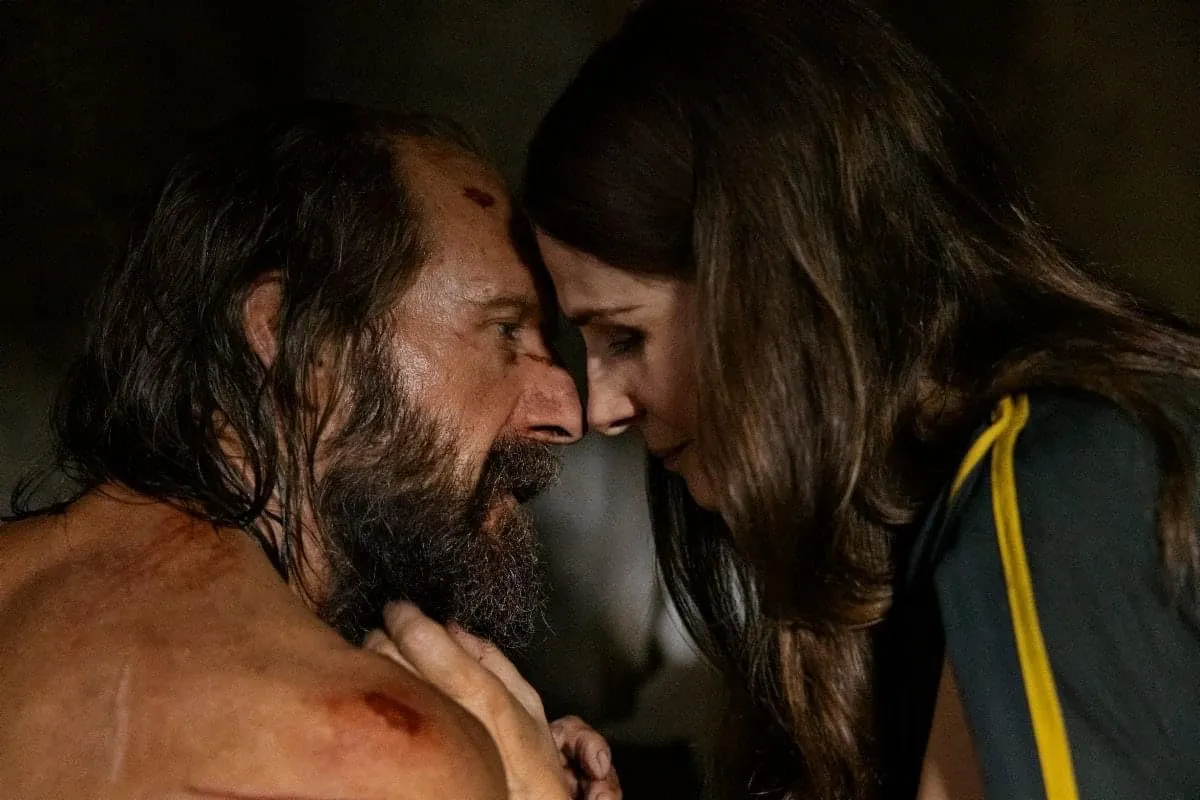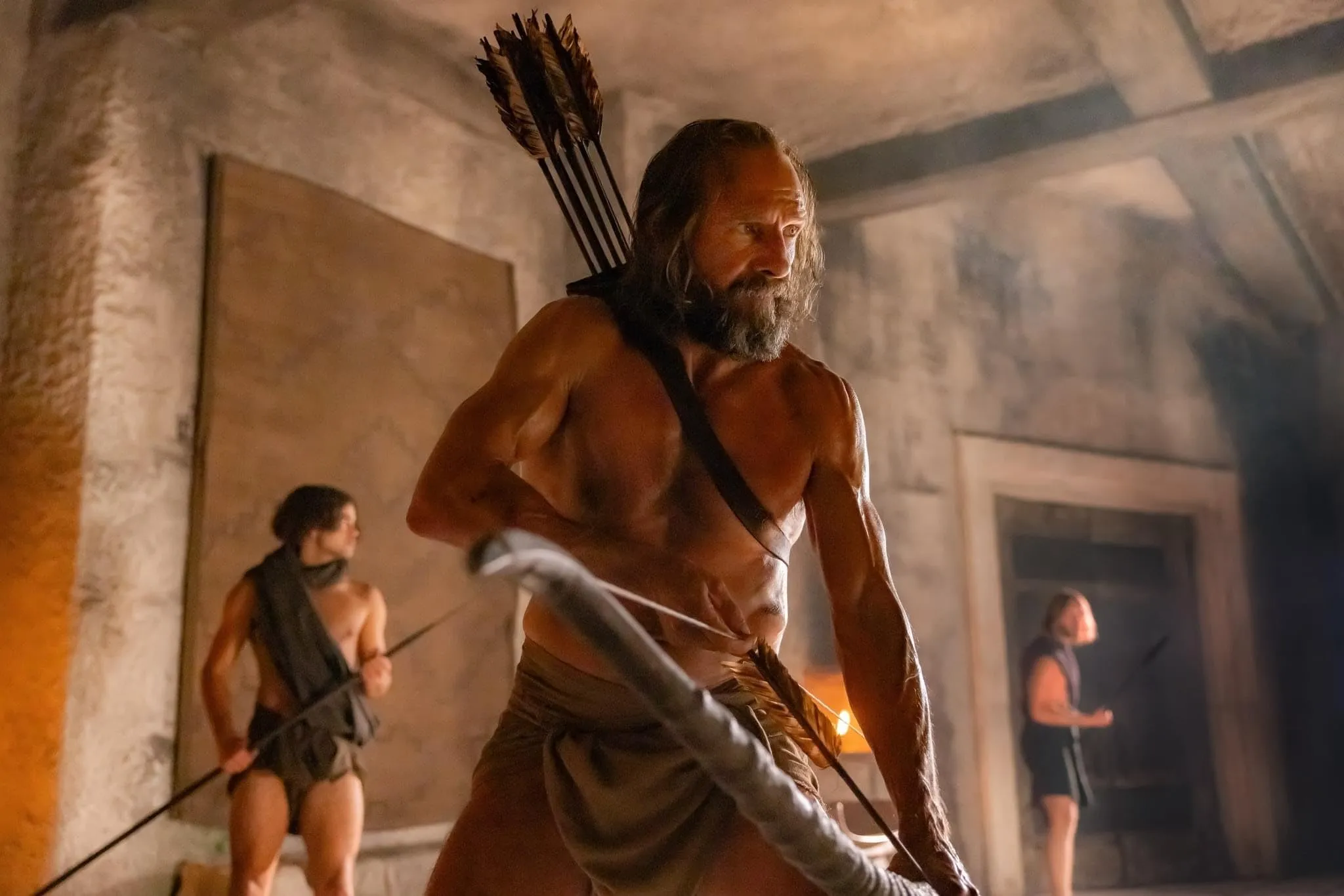When most people picture the classic tale of The Odyssey, what comes to mind are legendary beasts, miracles performed by gods, and fantastical voyages across the sea. But Uberto Pasolini’s new film The Return sets sail on a different course. It home sin only on the part of Homer’s epic poem where Odysseus at last reaches his destination of Ithaca after twenty years away at war.
We learn Odysseus fought bravely alongside other Greeks to vanquish the city of Troy. But the journey home proved an even greater challenge, with harrowing encounters with monsters and deities that delayed his family’s reunion for years more. Now at last a beaten man washes ashore on the island shores he once knew as king. But the kingdom he left behind has fallen into disarray.
The long-waiting and loyal Penelope struggles to govern in his absence, her rule continually under threat by arrogant suitors vying to take the vacant throne. Their son Telemachus comes of age surrounded by such instability. What’s more, the man who emerges from the seas is visibly haunted by past battles, physically and mentally worn from untold struggles.
Pasolini’s film is a bold stripping down of Homeric myth, focusing not on fantasy but on the very human impacts of war through the fractured royal family struggling to reunite. With stripped-back visuals and performances led by Ralph Fiennes and Juliette Binoche, The Return sets out to seek new insight into classic characters and explore timeless themes of home, duty, memory, and healing in its shadows and silence. This review will evaluate how successfully Pasolini’s daring vision brings the epic home.
Life After War
Let’s talk about the plot of this adaptation. To set the scene, Odysseus has been away from home for two decades due to the Trojan War. Another ten years were spent wandering as he tried to return to his wife Penelope on their island of Ithaca. Pasolini’s version starts with a battered Odysseus finally making it back.
But home isn’t the same. With Odysseus gone so long, the kingdom has fallen into disarray. Abusive suitors have moved into his palace, pressing Penelope to remarry one of them. Their son Telemachus struggles with this turmoil too as he comes of age. We find Penelope steadfastly refusing the suitors’ demands as she maintains faith her husband will return.
Odysseus, meanwhile, is visibly scarred inside and out from his ordeals. He fears his family won’t accept who he’s become. Much of the film follows these three fractured characters living separate lives in the same place. Pasolini streamlines the story this way to focus on the emotional and psychological aftermath of war rather than fantastical monsters.
Some key changes see Telemachus now repulsed by his father rather than joining him. And we don’t get Odysseus’ adventures, just the heavy toll they’ve taken. Tensions intensify between Penelope and the suitors, threatening her people and son. There’s a stripped-back, primal feel reflecting the broken state of the kingdom and its people.
Through creative choices like these unexpected plot points, Pasolini crafts a fresh look at how war reshapes relationships long after the battlefield. Now let’s meet our leading players in this dramatic return home.
Directing with Diminishment
Director Uberto Pasolini brings his vision for this story to life through some striking cinematic choices. He coaxes wildly nuanced performances from leads Ralph Fiennes and Juliette Binoche that do so much with so little. Their longing gazes and weighted silences speak volumes without a word being said. Through attentive directing, small gestures take on grand meaning.
To match these inwardly focused performances, Pasolini crafts an atmospherically subdued world. Shadows and flickering firelights become just as much a character as any actor. Cinematography bathes the island in melancholic hues that seep into your bones. With composer Rachel Portman’s stirring score, even the silence feels loud.
Through spare production design, we see the faded glory of a once-great kingdom. Waning fields and bare halls reflect the diminished state within its people after the war’s long absence. This stripped aesthetic distills the story down to its emotional core, freeing us to feel each fragile thread binding this broken family.
Some might question removing fantastical elements from Homer’s epic myths. But Pasolini exchanges fantasy for gritty realism that haunts long after. His directorial diminishment downsizes a classic into an intimate domestic drama quite unlike any film of its kind. By rubbing away excess, we comprehend these characters’ inner landscapes more clearly than if faced with mythical marvels.
In The Return, less proves to be so much more. With his deft visual storytelling, Pasolini breathes new resonant life into ancient souls.
Masters of the Unspoken
This adaptation lives or dies by its cast and what powerhouses lead the way. Few act with the nuance of Ralph Fiennes, here sinking his teeth into a tormented soul. Each furrow of his brow conveys the trenches of war still dug deep within. With minimal words, he lets trauma haunt each breath.
Juliette Binoche is Binoche at her finest, Penelope’s perseverance and pain intertwining with envy of her former passion. Her resolve communicates what dialogue dare not. Together, these titans fill every anxious moment with an encyclopedia of feelings.
Their electric chemistry awakens the story’s still-beating heart. Through longing gazes and torn embraces, Fiennes and Binoche bring their central relationship to aching life. We witness clearly the resilience required to endure war’s aftermath and remember intimacy’s gentler half.
Regrettably, Charlie Plummer lacks his co-leaders’ nuanced wit. His telemachus too often stamps “distant son” with little shading between. A richer execution of this pivotal character’s dynamics could have deepened the narrative.
Yet minor faults cannot outshine these veterans’ brooding, beautifully understated work. In a film fueled as much by what’s left unspoken, they prove masters of letting subtext speak volumes. With scarce more than gestures and looks, Fiennes and Binoche elevate a Greek tale’s exploration of love, memory, and loss’s lingering injuries to remarkable new poetic heights.
Persisting Pains of War
This film digs deep into the scars that conflict leaves on those who live through it. Through Odysseus, we see how the horrors of Troy continue clinging to both mind and body, long after the fiery destruction ends. Nightmares don’t stop at shores reached, but follow you home in every shadow.
Absence caused by war spreads like a plague too. While armies fight abroad, what spreads at home? For the people of Ithaca, the king’s prolonged absence breed lawlessness within walls once guarded. Protection became oppression, and order descended into hoarding and chaos. The rule of might over right took root in their leader’s vacancy.
Even the family etched by war suffers fractures hard to mend. Pasolini imbues the royal fallout with depth, showing reverberations aren’t tidy or easy to parse. Where some embrace reunions, Telemachus pulls away bitter. Baggage dragged home isn’t dropped on doorsteps. Its weight tests every bond.
The film hints these were everlasting themes for Homer too—war was never clean or contained. Its infections found their way home by any means. In challenging ways, Pasolini’s vision echoes our era’s understanding that nobody escapes war’s reach untouched, as its damage persists in both seen and unseen ways down generations. Some scars never heal, a truth as timeless as it is timely.
Weighing the Rewards of Restraint
This film was not without flaws, as bold a task as its vision was. Some performances felt flat compared to the tour-de-force leads. And its deliberate slow burn pace won’t captivate all.
Yet Pasolini took immense risks in distilling such an iconic epic into its bare essence. Very few would dare a Greek tragedy with so little flair or fantasy. To focus entirely on the aftermath explored depths this story rarely has.
What rewards came of this restraint? Stripped of excess, the themes hit with resonant force. Through its two masters of nuance, the characters’ inner struggles gripped you in compassion. Sparse scenes spoke volumes, letting imaginings fill their quiet.
While not for those craving thrill-a-minute action, the film offered rich food for thought. It stirred reflection on war’s persistence long after proclaimed victories. As a character piece, few can surpass its haunting intimacy.
Overall, The Return succeeds in its ambitions to reinvigorate a classic through thoughtful simplification. Not a film for all tastes, but for lovers of complex characters painted with sparse yet masterful brushstrokes, it offers memorable viewing. Sometimes less truly can be so much more.
Bringing Homer Home
And so, in concluding, The Return proves a stirring reinterpretation of an epic classic. Stripping centuries of myth down to its bare essence, Pasolini’s vision illuminates dimensions of Homer’s verses rarely realized onscreen.
Through lonely yet magnetic leads, it paints a portrait of broken souls scarred by conflict’s far reach. Where some adaptations dazzle with bombast, this introspective film grants its audience space for quiet reflection. Not all choices wholly resonate, yet its rewards make overlooking minor flaws easy.
At its stimulating best, the film immerses us in post-war lives worn thin by absence, unpacking war’s persistent hold even once declared done. In distilling a story down to intimacy over grandeur, it peers across the balcony and finds new layers of meaning packed tight into the silences between.
Not all films aim to linger with their themes, yet Pasolini ensures this one does. The Return resurrects classic characters with a modern eye to cast light on timeless struggles, bringing Homer home in the most starkly human of terms. For those who appreciate sparse stories that burrow deep inside, this revised Odyssey proves a journey worth taking.
The Review
The Return
The Return succeeds as a thoughtful, introspective film adaptation that revitalizes classic characters through purposefully sparse storytelling and masterful lead performances. While not a flawless picture, Pasolini's interpretive vision resonates long after by grappling meaningfully with themes of war, family, memory, and homecoming.
PROS
- Complex characterization of Odysseus and Penelope through nuanced performances
- Evocative visual style that immerses the viewer in the post-war atmosphere
- Thought-provoking exploration of themes like trauma, absence, and familial strain
- Stripped-down approach allows intimate focus on character dynamics and subtext.
CONS
- Slow pacing may frustrate some viewers expecting an action-packed epic.
- Some secondary characters like Telemachus are not as fully realized.
- Ambiguous plot points left open to interpretation



















































Discussion about this post